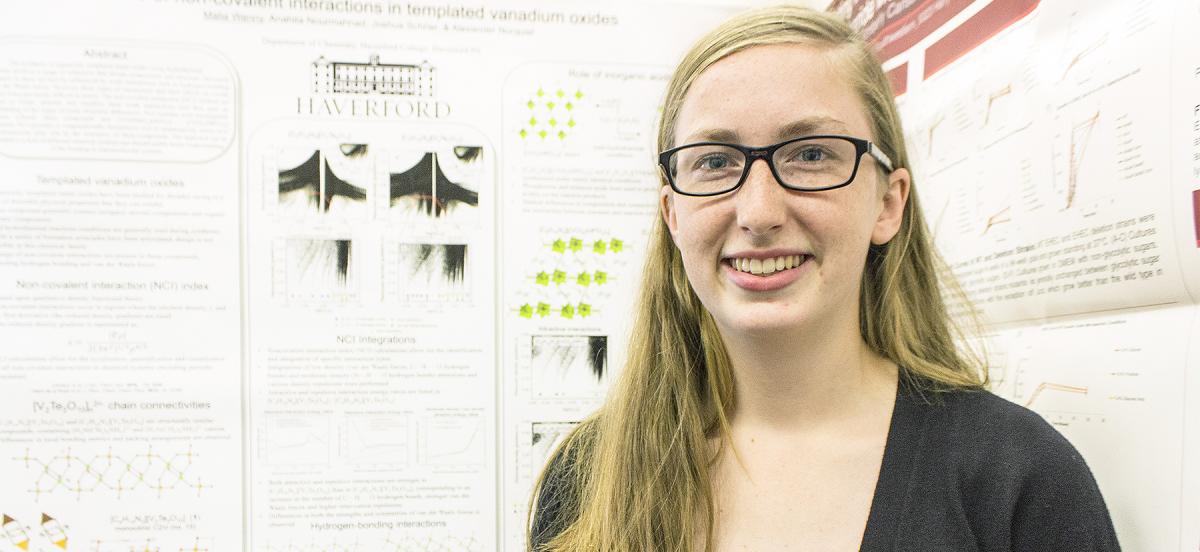Malia Wenny '17 Awarded Department of Energy Fellowship

Malia Wenny '17 with her poster at the at the 2015 Undergraduate Science Research Symposium held in Zubrow Commons. Photo by Hina Fathima '15.
Details
The recent chemistry major, who is now pursuing a Ph.D. at Harvard University, is one of only 5 percent of applicants chosen for the selective DOE Computational Science Graduate Fellowship.
Malia Wenny '17, has been awarded a Department of Energy Computational Science Graduate Fellowship (DOE CSGF) to support her graduate chemistry research. Less than 5 percent of applicants are chosen for the fellowship each year.
At Haverford, Wenny was an environmental studies minor and scientific computing concentrator, and in May, she received her bachelor’s degree in chemistry from the College. She is currently in the chemistry doctoral program at Harvard University.
"I was quite shocked and undeniably excited when I heard that I had received the fellowship," said Wenny, who is from Galena, Ill. "I got the call in early April, just as my thesis work was really in crunch time with final experiments and writing. It was just what I needed at that time of year. I worked hard to prepare my application—and really, all of my Haverford experience was excellent preparation—and it was gratifying to see my hard work come to some success."
The DOE CSGF fully funds her tuition and fees at Harvard and provides a stipend for four years. It also offers the opportunity to do a 12-week research practicum at one of 21 Department of Energy labs across the country—something Wenny will undertake next year.
"Since I've already begun my graduate work, this fellowship will help me choose classes, focus my research, and gain access to other opportunities for networking and professional development," she says.
The DOE CSGF, administered by the Krell Institute of Ames, Iowa, is funded by the DOE’s Office of Science and the National Nuclear Security Administration. Each year, the program grants fellowships to support doctoral students whose education and research focus on using high-performance computers to solve complex science and engineering problems of national importance. Since it was launched in 1991, the DOE CSGF has supported 436 students at more than 65 universities. Wenny joins a group of 20 first-year fellows in 2017, bringing the total number of current DOE CSGF recipients to 79 students in 14 states.
Wenny credits Haverford, and its chemistry department in particular, with helping her decide what to do after graduation and preparing her for the graduate-level research that lay ahead for her.
"The chemistry department has built an effective framework for thoroughly educating students and challenging them to do research early on in their careers," she says. "In particular, I'm grateful to my thesis advisors, Josh Schrier and Alex Norquist, who helped me develop my skills as a scientist and gave me tremendous amount of support from the day I starting working with them freshman year. By doing research in their labs, I pursued research questions that interested me—materials for renewable energy—and saw the power of computational methods, which then motivated me to apply for this computationally-focused fellowship. I strongly encourage any Haverford student who is interested in computational work in graduate school to apply for this fellowship—it's an amazing opportunity!"



